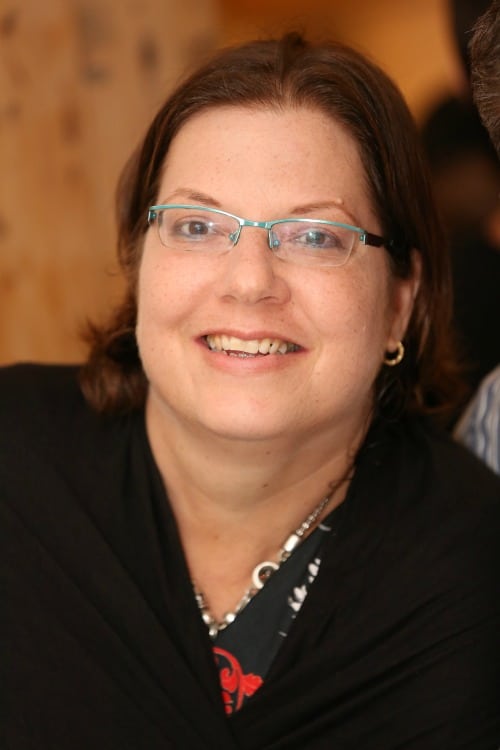
by Susie Newday (Israel) | Nov 16, 2013 | 2013, Cancer, Health, Israel, Susie Newday, World Motherhood

Neta sat down with World Mom contributor, Susie Newday in Israel to talk about living her life with metastasis breast cancer.
This is part two of our contributor and cancer nurse, Susie Newday’s, moving and in depth interview on breast cancer with her close friend. Grab a cup of something warm, and come be a fly on the wall with us, as two friends discuss living with metastatic breast cancer. There is something for us all to learn. (Click to catch up and read Part I, first.)
Susie: You know what I remember? I remember before I worked in oncology, when you were diagnosed for the first time. You were waiting for your scan results to see whether there was any metastases and you said to me, “If I have metastasis, my life is over.” When you were diagnosed with the recurrence was that the same feeling you had?
Neta: Yes, that was my feeling. I said to myself, I’m screwed. With metastasis you don’t recover. You get another year or two.
S: Or maybe longer.
N: I have to say that I have a hard time believing that. I don’t really see that in the cards.
S: I wish you many more years.
N: I wish. And I thank you very much, and I hope I do. I’m not saying I want to die, I don’t. I’ll be happy to be surprised for the good but the feeling is that this is the end.
S: You walk around with the feeling everyday?
N: Now it’s less. Since I lived through the setback I had with the bleeding in my brain, and everyone told me that I’m a medical miracle, I now say to myself that maybe there are miracles out there.
I am more open to the possibility that maybe there will be a miracle here, something I refused to believe beforehand when my cancer recurred.
S: Tell me what happened with your setback and the hospitalization.
N: When I was rediagnosed, I was receiving Aredia to strengthen my bones and a biological treatment that was part of a clinical trial. I went back to work. About two or three months after that I began having severe weakness. My hemoglobin kept going down and they decided to hospitalize me. My oncologist told me that the cancer has reached my bone marrow. I was hospitalized in the regular medical ward for a week and a half until space opened up in the oncology ward and then they moved me. I received blood transfusions and chemotherapy.
A day or two after I was moved, I started having confusion, and then I couldn’t see. For about 5 days I had what seemed like a gray veil over my eyes. I don’t remember much but they told me I was really confused, and they had to appoint a legal guardian to make my medical decisions. To do that I needed an interview with the psychiatrist. He asked me a lot of questions which I don’t remember,
but I do remember that he asked me how old my children were and I couldn’t tell him. I knew their names but not their ages.
My husband brought the kids to visit me, but afterwards he told me that it was a difficult decision whether or not to bring them because I couldn’t see, and they didn’t want the kids to get scared. He had consulted with the psychologist who said to bring them because it’s better for them to see their mother even if she is confused and doesn’t see than not to see her.
It was 5 very difficult days. They ran all kinds of tests from eye tests to an MRI. I remember being very afraid before the MRI. I remember them saying it’s a very important test to see what’s going on. Inside the machine everything was rotating, and there was a horrible noise. I remember it being very traumatic, also the MRI test itself and also the fact that I knew it was a very important test, and I didn’t know what they were looking for. After the fact, I now know they were looking for metastases in the brain. They didn’t find any, it was only a brain bleed, and then they said the situation is better than they thought.
I don’t remember everything from those days. I remember people coming to visit. I recognized the people who came.
Later on, I found out that my husband already prepared the older girls a bit to expect the worse. They said psalms, and no one really thought I was going to recover because my medical state was not good. Then on the fifth day I woke up in the morning, my mother came into the room, and I was able to see her.
The doctors came, and they did tests. My eyesight came back, but slowly. Even now I can see perfectly from far but my vision from close is still impaired and interferes with reading. But at least I see the world, I see things. I don’t need help walking.
Since that incident I say to myself maybe there is some kind of miracle going on here, maybe there is some kind of divine intervention. In the hospital everyone was saying they had never seen someone recuperate like I did with their eyesight returning. Maybe it had something to do with my willpower. After my husband was diagnosed, I realized why it was that I pulled through, why I’m still here. I’m here to organize things and take care of my family. It is much harder when both parents are ill. I couldn’t “go” and leave my husband here alone to also fight his disease and raise the children because it is impossible to do. Apparently someone up above realized that I’m still needed here. That’s the answer I give myself. No one has said that to me, I just feel it. No one has answers but after my husband was diagnosed with cancer I just understood why I am still here.
S: When was your husband diagnosed?
N: January 2013. He was admitted with a bowel obstruction and then was diagnosed with Metastatic Colon Cancer. He was diagnosed about 2-3 months after my prolonged hospitalization, and I hadn’t really recuperated yet. I had slowly been getting better. I would be hospitalized for a week or so and then released and then hospitalized again for a week. It was a big shock having another person in the family sick. When he wasn’t feeling well and needed to go to the Emergency Room I still wasn’t feeling great and I couldn’t drive. His brother came and picked him up.
S: What was going through your head when your husband was diagnosed?
N: That someone up above is crazy. It’s not just that I’m sick, and now he’s sick. It’s the fact that both of us are in a situation where the doctors are not optimistic. It’s not a situation where you can say to yourself that I will definitely beat this. It could be 1, 2 or 3 years. No one has any idea how long you have for sure. I said to myself and to God, why him? * He is such a good person. For sure he hasn’t sinned. Maybe I sinned unwittingly but him? With my husband it seemed like a different level, it was like he doesn’t deserve this. He is such a good person.
S: And you deserve it?
N: No. But HE is really a good person. He’s a better person than me. He has a good heart, he doesn’t hurt people. * I just couldn’t reconcile how it was possible that he could be sick because he didn’t deserve it because he is such a good person. You start saying to yourself that God went crazy. Is there no justice in the world? Two young parents with 4 children are both now sick. Something went wrong. Either God is putting us through some great trial or I don’t know what. It’s not fair. I felt very strongly that it was just not fair that he was sick too, it was enough that I was sick.
*(I went to get some tissues at this point for her, which were easy to find because as she said there are lots of tissues in her house.)
S: I think that women and especially mothers don’t see ourselves the way other people see us. We are very generous towards other but we don’t cut ourselves any slack. I’m flabbergasted how you’re talking about how your husband doesn’t deserve this to happen to him and you do? (We both started laughing at that point)
N: He is the kind of person who if you ask directions on how to get somewhere, even if it’s out-of-the-way he will take you there. I would try to explain, I would not take anyone all the way there.
S: What good things do you see in yourself, what things do you do that are good and that are unique to you?
N: I have more sensitivity to people. My husband doesn’t see certain things that I’m more intuitive about, also in life and also in work. Part of my job was to be sensitive to kids. I have more sensitivity to my surroundings which my husband might sometimes miss because he just doesn’t see it. I can be a good friend. As far as the kids, I’m more involved, I am with them more. I never said I don’t do good things. My husband is just good.
S: Were you always as involved with your kids or is it more since you have been sick?
N: It was always very important for me to be a mother, to be with the kids. The thing that stressed me out the most when I got sick was the kids, what’s going to be with the kids. I still struggle with that. I was always with them. After my births I took extended maternity leave. I saw motherhood as a very important role. I always had that, it’s not something that started now.
(For the full series: click here to read Part I, click here to read Part II, click here to read Part III and click here to read Part IV.)
This is an original post to World Moms Blog by our Africa and Middle East Editor, Susie Newday, in Israel.
Photo credit to the author.
Susie Newday is a happily-married American-born Israeli mother of five. She is an oncology nurse, blogger and avid amateur photographer.
Most importantly, Susie is a happily married mother of five amazing kids from age 8-24 and soon to be a mother in law. (Which also makes her a chef, maid, tutor, chauffeur, launderer...) Susie's blog, New Day, New Lesson, is her attempt to help others and herself view the lessons life hands all of us in a positive light. She will also be the first to admit that blogging is great free therapy as well. Susie's hope for the world? Increasing kindness, tolerance and love.
You can also follow her Facebook page New Day, New Lesson where she posts her unique photos with quotes as well as gift ideas.
More Posts - Website
Follow Me:






by Susie Newday (Israel) | Oct 31, 2013 | Body Image, Cancer, Death and Dying, Family, Interviews, Israel, Susie Newday, World Motherhood

Neta sat down with World Mom contributor, Susie Newday in Israel to talk about living her life with metastatic breast cancer.
As a nurse working in outpatient oncology, cancer is something I’m surrounded by. As time goes by, I’ve unwillingly learned to live with the fact that it seems like cancer is taking over the world and affecting more and more young people. (I stink at statistics so I don’t have any hard facts to back that feeling but I seem to be seeing way too many young people undergoing chemo.) Yet even with the walls we build to protect ourselves from the hurt at the loss of each patient we have come to know, every nurse has a soft spot for certain patients. For me, it’s young mothers with cancer. I don’t know why. It just is. When the young mother being treated for breast cancer also happens to be your friend it’s even more heartbreaking.
Today is the last day of Breast Cancer Awareness Month. I thought that a personal story of someone living with Stage 4 Breast Cancer would do more to help raise awareness than just stating the facts and figures. By putting a name and a face to a disease we make it more personal. My friend graciously agreed to be interviewed in the hope that her story would help someone else.
Neta Eshel, is a 42-year-old mother of 4 children ages 6 1/2, 9, 13 1/2 and 17. She was diagnosed in July 2009 with Stage 3 Infiltrating (Invasive) Lobular Carcinoma. As far as she knew, there was no family history of breast cancer. She was treated with aggressive chemo, had a double mastectomy, radiation and more chemo. In September of 2011 her cancer came back. She has Stage 4 Breast Cancer with metastases to her bones.
Towards the end of 2012, Neta was hospitalized for a prolonged period of time due to a low platelet count. During that hospitalization, she woke up one morning and couldn’t see. After running a battery of tests she was told she had bleeding in her brain. She was confused and disoriented and her family braced themselves for the worse. Then, as if by a miracle, her sight returned, and she improved.
A few months later, before she even had time to catch her breath Neta’s husband was diagnosed with Stage 4 Colon Cancer. As you can imagine it, that was devastating news. Their individual and combined strength in coping has been and continues to be an inspiration for their family, their community and their many friends.
Susie: Did you have any symptoms?
Neta: I felt a lump in the shower, and I went to get checked.
S: Do you have a family history of cancer?
N: Not in my or my parents’ generation. I didn’t know about it until after I was diagnosed but there was a history of cancer in my grandparents’ generation. That’s why there was no awareness. My father’s father had pancreatic cancer, one of his sisters had breast cancer and the other sister had ovarian cancer. There was also another brother who died of cancer. I’m not sure what type. Both of my grandfather’s sisters passed away when I was young, so I didn’t really know them. On my mother’s side there is no history of cancer.
S: After you felt the lump what did you do?
N: I went to my family physician who sent me right away to the breast surgeon*. The surgeon told me to go immediately to the hospital. (*note: Here in Israel it is the breast surgeon who does breast screening.)
S: How long did it take from the time you felt the lump until you were diagnosed.
N: No time at all. Maybe four days.
S: What did they do when you got to the hospital?
N: First they did a mammogram. They then sent me immediately for an ultrasound. After the ultrasound I had gotten dressed, and I stood up, and the doctor who performed the ultrasound told me straight out “you have breast cancer”. I was at a loss for words. I stammered… How? Why? What connection does cancer have to me? I was in shock. I asked her “How do you know?” She said she knows according to the way it looks on the ultrasound. She said it’s not 100% certain, we still have to do a biopsy but she was pretty sure that’s what it was.
S: You were alone?
N: I was with my husband. I understood it was something serious the way everyone kept sending me quickly from one test to the other, but I didn’t really understand.
S: Aside from the shock, how did you feel about the way she gave you the news?
N: I don’t think it would have been any better to wait anxiously for two weeks until the biopsy results came back. I would have been very stressed out from the wait. I wanted to know the truth, I was just in shock because the whole process was very quick. I suddenly went from being the healthiest person to be the sickest person. I didn’t need someone to beautify the reality for me, the reality was the reality. The bottom line was, I didn’t need the stress.
S: What thoughts and feelings were going through your head at that moment when you got the news?
N: I remember the shock. I remember thinking I am the healthiest person, how am I going to be sick now? I also thought about the kids and what’s going to be with them. I had no idea what to expect, no awareness about what treatment meant. I didn’t really understand the implications at that moment. Afterwords when I started to process it there was a lot of crying and anger and sadness.
S: How long did the processing process take?
N: I don’t remember how long each stage took. I do remember there being a lot of anger. Anger at God. Why me? What have I done? Why do I deserve this?
After you start to process you realize that the anger doesn’t give you anything so you move to acceptance. You summon energy for a war. From the beginning I said I’m going to fight this, I’m going to win. I don’t remember being depressed. I was very into “doing”. I’m going to fight. I’m going to understand this and what it means. I don’t remember any great depression. It was obvious to me that I would fight and it will be ok.
A few months after I finished treatment, in the summer, we went on an overseas family trip, and my energy returned. I then said that I need a little luck that the cancer won’t return.
S: When did the cancer return and how?
N: It started with back pain. Two years ago, in September of 2011, my back went out on the day of the first day of school. I worked as a high school guidance counselor. The back pain went on for a few months. I right away thought about cancer but I was afraid to get it checked out by my oncologist. I first went to get checked by an orthopedist. I did a bone scan and then was treated by a chiropractor for two months. It took about two or three months before it was diagnosed as a recurrence of the cancer. It was unbelievable pain. The pain came and went until it stayed.
S: What was different when you were diagnosed the second time? Was it the same shock?
N: The second time it was much harder because I understood that if it has returned, the situation is much worse. I always had the fear that the cancer would return. I hadn’t deluded myself that it couldn’t. I knew there was a possibility of it returning. It was much harder because I understood that if it has returned there is metastasis and I’m most probably not going to get rid of it. I understood what it meant and that’s why I was also afraid to get diagnosed and didn’t run immediately to my oncologist. I thought maybe my back just went out. People said to me, at one point or another back pain happens to everyone around the age 40. The shock was greater when the cancer returned because I understood that it’s not going anywhere and I can’t “get over it”.
***This post was truncated because it originally also included Part II.**
Tune in soon for the next part of a World Mom to World Mom 4 part series on living with metastasis breast cancer. The informative, yet moving, interview with Neta continues…
Cancer can happen to everyone. Listen to your body, treat it well and educate yourself about cancer symptoms. Learn not just about breast cancer symptoms (which are varied) but also the symptoms of ovarian cancer, GI cancer, lung cancer, pancreatic cancer and all the other cancers out there. Ask your parents about your family medical history. Do the recommended screening tests that are available to you because early detection of any cancer makes a hell of a difference.
Most of all enjoy every minute of your life because there are people out there who are dying for more time.
Do you have an experience of someone living with metastasis breast cancer in your corner of the world?
(For the full series: click here to read Part I, click here to read Part II, click here to read Part III and click here to read Part IV.)
Click here to read Part IV of the interview.
Photo credit to Susie Newday.
Susie Newday is a happily-married American-born Israeli mother of five. She is an oncology nurse, blogger and avid amateur photographer.
Most importantly, Susie is a happily married mother of five amazing kids from age 8-24 and soon to be a mother in law. (Which also makes her a chef, maid, tutor, chauffeur, launderer...) Susie's blog, New Day, New Lesson, is her attempt to help others and herself view the lessons life hands all of us in a positive light. She will also be the first to admit that blogging is great free therapy as well. Susie's hope for the world? Increasing kindness, tolerance and love.
You can also follow her Facebook page New Day, New Lesson where she posts her unique photos with quotes as well as gift ideas.
More Posts - Website
Follow Me:






by Nihad | Oct 30, 2013 | 2013, Egypt, Family, Health, Holiday, Humanity, International, Life Balance, Life Lesson, Parenting, Uncategorized, World Motherhood
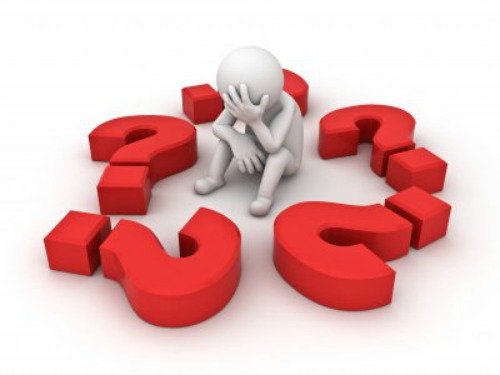 Writing this post was the most challenging of all the posts I’ve ever written. You may not find it that valuable, but I will still go with writing and publishing it. Actually I wanted and needed to write, but I didn’t know what exactly I wanted to share it. My thoughts and my mind are a real mess.
Writing this post was the most challenging of all the posts I’ve ever written. You may not find it that valuable, but I will still go with writing and publishing it. Actually I wanted and needed to write, but I didn’t know what exactly I wanted to share it. My thoughts and my mind are a real mess.
Since the beginning of the 2013, life was really hard for me. First, I lost my father, and although I was accepting this fact and apparently I was calm, I was unaware that I was plunging into depression. It took me five months to realize it and accept the idea that I needed therapy. When I started to feel better, the situation in Egypt deteriorated, and we were under curfew for months. I was imprisoned at home and rarely went out. I lost interest in everything except the political talk shows, but later on I realized that was the main cause of my feeling down and fearful most of the time. I totally lost motivation to do anything and lost interest in anything. All I wanted was to stay still and silent for hours. (more…)

Nihad is an Egyptian woman, who was born and has lived her whole life in Alexandria, Egypt. She says, “People who visited this city know how charming and beautiful this city is. Although I love every city in Egypt, Alexandria is the one I love the most.”
She is a software engineer and has worked in the field for more than twenty years. But recently she quit her job, got a coaching certificate and she is now a self employed life and career coach. She says, “I believe that women in this era face big challenges and they are taking huge responsibilities. That's why I have chosen my niche -- women looking for happiness and satisfaction. I help and support them in making whatever change (career change, life change, behavior change, belief change…) they want to bring more satisfaction and happiness in their lives.”
Nihad is a mother of two lovely boys, 15 and 9 years old. She states, “They are the most precious gifts I have ever had. I madly love them, and I consider them the main source of happiness in my life.”
Our inspiring mother in Egypt can also be found at Aurora Beams Life Coaching.
More Posts

by Mama B (Saudi Arabia) | Oct 16, 2013 | 2013, Cultural Differences, Human Rights, Humanitarian, Millennium Development Goals, Saudi Arabia

When we grow up with something in our lives we don’t think about it much anymore. It’s just there, being, and we don’t notice it’s effect on the world around us. It’s there and always was there. We don’t give a thought about how it got there and why it’s there and never have the luxury of seeing it all for the first time and realising just how big and amazing it all is!
That was my relationship with Alnahda Philanthropic Women’s Society. I grew up volunteering there (With many many girls of my generation) and the women who run it, staff it and make everything happen are an inspiration to watch. I started ‘helping’ with their yearly bazaars and joining the fashion shows. It was fun. We were doing good and proud of it. But yes, mostly it was fun.
Alnahda is a non-profit society founded in 1962 by some of the strongest Saudi women. They were empowered, educated and forward thinking women who have always been pioneers in the advancement of women’s roles and opportunities in Saudi Arabia.
So many people around the world know of the barriers facing women in Saudi but not enough know of the steps that are being taken to bring these barriers down and Alnahda is one of the first to take these steps making a path for women to be leaders in their homes, communities and in Saudi.
They initiated the fight against illiteracy, established the first women’s library in Riyadh, are a leader in vocational training and rehabilitation for women with special needs. Alnahda also established emergency residential shelters for families with difficulties and have always had a strong interest in preserving Saudi heritage. Their collection has 5000 pieces from dresses, jewellery and original traditional doors.
I grew up and out of the age of wanting to do the fashion shows and actually did start properly helping when they needed volunteers. As the years passed I got less and less involved because I moved away to go to university then I got married and had my children. I would go to their events and volunteer when I could but I was nowhere near as active as when I was a child!
Last year when they were celebrating their 50th year I was reintroduced to it as a newcomer, and a mother of one daughter, for the first time and I saw how much effect this remarkable society had on the world around us! I was blown away by how many women Alnahda was able to reach from all different financial and educational backgrounds.
Alnahda focuses on women led households. They work on giving these women the tools to empower them as mothers and bread winners for their families. They train women and help them find employment.
Alnahdha also helps women who don’t need financial or educational help but are lacking the support and guidance to start their careers. They have done this not only for individuals but for other societies as well such as the Saut Down Syndrome Society that started in the 80’s as a small preschool for 4 children on the grounds of Alnahda and now is an independent entity that is well on its path to opening schools around the Kingdom.
Alnahda has one program so powerful it will literally change the course of so many women’s lives. The program is called ‘mustaqbali’ My Future. This program works on changing the mindset of young women who have lost hope for their future. They have worked with young women who have dropped out of school and motivated them to go back and get their high school degree. They have helped these women get college degrees or the proper training for the career that suites them. They guide women in finding themselves and empower them to make the best of their lives.
Alnahda Philanthropic Women’s Society is the embodiment of the UN’s third Millennium Developmental Goal of promoting gender equality and empowering women.
It gives me pride to be part of this society that never deviated from its mission “to empower women socially and economically through financial and social support, training, and employment.”
These are some of the people who are paving the way for my daughter not to have to restrict her options, stop herself from dreaming or expect less of herself. What do I want my daughter to do when she grows up? I am hoping I won’t be the one telling her and I am praying she will be spoilt for choice!
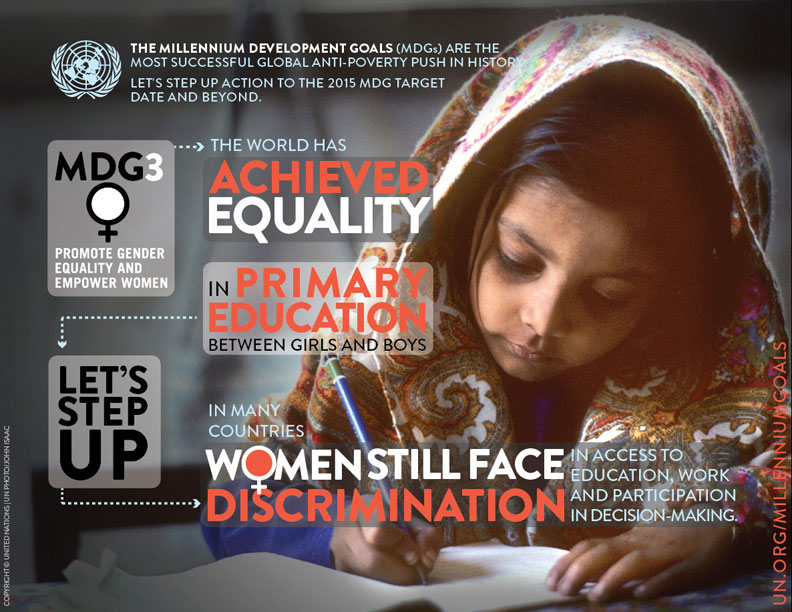
Join us today for our #Moms4MDGs Twitter party to discuss Gender Equality with @GirlUp at 1:00 EST, and with Plan International @PlanGlobal at 9pm EST. Wondering what time that is in your country? Check HERE. In joining in you will automatically be entered to win a copy of Malala Yousafzai’s new book I Am Malala. We hope to see you there!
This is an original post written by Mama B. for the World Moms Blog #Moms4MDGs campaign on World Moms Blog and in Arabic on Alnahda in Saudi Arabia.

Mama B’s a young mother of four beautiful children who leave her speechless in both, good ways and bad. She has been married for 9 years and has lived in London twice in her life. The first time was before marriage (for 4 years) and then again after marriage and kid number 2 (for almost 2 years). She is settled now in Riyadh, Saudi Arabia (or as settled as one can be while renovating a house).
Mama B loves writing and has been doing it since she could pick up a crayon. Then, for reasons beyond her comprehension, she did not study to become a writer, but instead took graphic design courses. Mama B writes about the challenges of raising children in this world, as it is, who are happy, confident, self reliant and productive without driving them (or herself) insane in the process.
Mama B also sheds some light on the life of Saudi, Muslim children but does not claim to be the voice of all mothers or children in Saudi. Just her little "tribe." She has a huge, beautiful, loving family of brothers and sisters that make her feel like she wants to give her kids a huge, loving family of brothers and sisters, but then is snapped out of it by one of her three monkeys screaming “Ya Maamaa” (Ya being the arabic word for ‘hey’). You can find Mama B writing at her blog, Ya Maamaa . She's also on Twitter @YaMaamaa.
More Posts
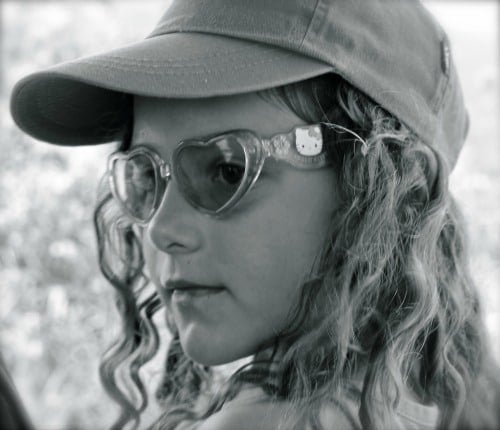
by Susie Newday (Israel) | Oct 9, 2013 | Childhood, Israel, Life Lesson, Parenting, Susie Newday
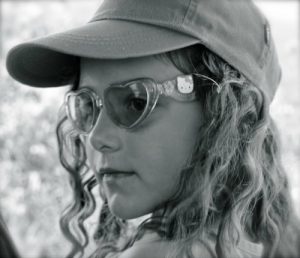 I have a confession. I obviously used that title to draw you in because even though I have not read the book, I know enough from the reviews to say that there is no one in the world who thinks the book 50 Shades of Grey is for kids. Sadly though, that book has tainted one of my favorite go to phrases: “shades of grey”.
I have a confession. I obviously used that title to draw you in because even though I have not read the book, I know enough from the reviews to say that there is no one in the world who thinks the book 50 Shades of Grey is for kids. Sadly though, that book has tainted one of my favorite go to phrases: “shades of grey”.
We all like to think that we can break things down into black and white, when in essence, life is many shades of grey constantly swirling and combining in different intensities. Coming to grips with shades of grey is something that only really ripens in adulthood, and even then, the acceptance and understanding that the world and life are not black and white is a slow process .
I don’t think I truly understood that until the other day when I had a heated discussion with my 21-year-old son about a topic on which we have major differences of opinions.
Yes, he is an adult. Yes, he is a soldier. Yet he still sees things as black and white, kind of like I did at his age. I was frustrated by his not being able to see that there are many shades of grey in every disagreement between people and nations.
When I thought about it more, I realized that I miss the naiveté of my youth when things were black and white for me. I miss knowing what is 100% right and what is 100% wrong. I miss being sure of what is good and bad. I miss the conviction of “knowing” the truth and being sure that I will never waver on my principles.
Today, I know that there really is no black and white. Our values generally stay strong, and they guide us in how we live our lives. On the other hand, our principles can change depending on the circumstances. In other words, we use our values to decide what and when we take a stand on something. Adults (for the most part) can better see different sides of the story and realize that compromise isn’t always the end of the world. We are generally less vested in being right, and we try, not always successfully, to see the bigger picture.
Kids on the other hand need the black and the white. They need to be able to fit good and bad into neat boxes. Strong or weak? Ugly or pretty? Smart or stupid? They need to be confident in what is right and what is wrong. Good or bad? Safe or dangerous? Maybe that’s why fairy tales have very clear-cut good and bad characters. Children need the peace of mind that comes with unshakeable beliefs.
Shades of grey make a shaky foundation for confidence and assurance. Black and white are unbreakable cement pillars, which can explain why grey takes so long to learn.
Black and white may be advantageous to kids for both safety and social purposes by helping them sort people and the world, understand what is safe for them and how to belong to a group. However, black and white is also extremism. It’s an either or mentality. It reduces a whole spectrum of possibilities to only two options without entertaining or acknowledging the whole gamut of possibilities in between. It’s the land of never and always. It’s the primitive childlike thinking adults slip back into when we’re going through hard times, when we are looking for certainty.
In life there isn’t one answer. There isn’t one truth. The world changes and evolves while black and white is stuck and interferes with creativity. When our world is black and white we end up spending a lot of energy on being right and trying to prove our point.
As parents we are charged with the great responsibility of instilling our kids with a moral compass. As part of that process, we consistently and sometimes unwittingly hoist our opinions and solutions on our kids. We do our best yet sometimes we forget that while children need their black and whites we have to stop and think how to begin to introduce them to shades and hues of grey.
We need to live our lives as a model for our children. We need to show them by our actions that there is more than our right answer. That being right doesn’t mean someone else is wrong, being wrong also doesn’t mean that someone else is right. We don’t have to agree with everyone but we should stop to listen and then think about what it is we really believe.
We all have our black and whites (which may or may not change over the years) but most adults have a many hued resplendent grey life. It takes courage to embrace grey. It means we’re willing to learn, change and entertain other points of view.
Do you think kids should learn about life’s shades of grey? If you do, how do you help teach them that life is not black and white?
This has been an original post to World Moms Blog by Susie Newday of Israel. You can find her positive thoughts on her blog, New Day New Lesson.
Photo credit to the author.
Susie Newday is a happily-married American-born Israeli mother of five. She is an oncology nurse, blogger and avid amateur photographer.
Most importantly, Susie is a happily married mother of five amazing kids from age 8-24 and soon to be a mother in law. (Which also makes her a chef, maid, tutor, chauffeur, launderer...) Susie's blog, New Day, New Lesson, is her attempt to help others and herself view the lessons life hands all of us in a positive light. She will also be the first to admit that blogging is great free therapy as well. Susie's hope for the world? Increasing kindness, tolerance and love.
You can also follow her Facebook page New Day, New Lesson where she posts her unique photos with quotes as well as gift ideas.
More Posts - Website
Follow Me:






by Mannahattamamma (UAE) | Sep 23, 2013 | Family, Family Travel, Kids, Older Children, Poverty, UAE, USA, World Motherhood
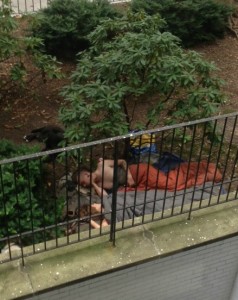 Ever since we moved out of Manhattan to Abu Dhabi, in the summer of 2011, our family has been lucky enough to do a lot of traveling. Seeing the world had been, in fact, one of the primary reasons we’d decided to make our move–well, that and the fact that we’d been offered interesting jobs in a fascinating (and sometimes frustrating) city. Our move coincided with a kind of “sweet spot” for our kids: they were old enough to be able to experience our travels and remember them…but not so old (read: teen-agers) that separating them from life in New York, in the shape of things like sports teams and romances, had become impossible.
Ever since we moved out of Manhattan to Abu Dhabi, in the summer of 2011, our family has been lucky enough to do a lot of traveling. Seeing the world had been, in fact, one of the primary reasons we’d decided to make our move–well, that and the fact that we’d been offered interesting jobs in a fascinating (and sometimes frustrating) city. Our move coincided with a kind of “sweet spot” for our kids: they were old enough to be able to experience our travels and remember them…but not so old (read: teen-agers) that separating them from life in New York, in the shape of things like sports teams and romances, had become impossible.
So off we went, carting twelve suitcases to the other side of the world, not entirely sure what we’d find when we arrived, but ready to explore. We’ve had some great trips and amazing experiences, seen stunning beauty and gut-wrenching poverty. Our journeys are not terribly rugged or adventurous (our kids aren’t that old yet, and let’s face it: I’m a big believer in things like indoor toilets and mattresses, which is to say: I’m a wimp), but I like to think that we are all being opened to thought-provoking encounters of all sorts. (more…)
After twenty-plus years in Manhattan, Deborah Quinn and her family moved to Abu Dhabi (in the United Arab Emirates), where she spends a great deal of time driving her sons back and forth to soccer practice. She writes about travel, politics, feminism, education, and the absurdities of living in a place where temperatures regularly go above 110F.
Deborah can also be found on her blog, Mannahattamamma.
More Posts
Follow Me:






















